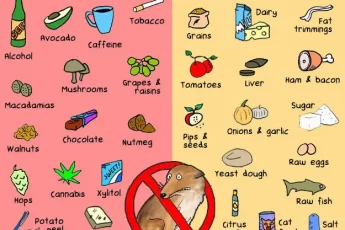
Dogs love to eat human food, and chicken nuggets are no exception. But can dogs safely consume this popular fast food item?
Chicken nuggets are typically made with breaded chicken that is fried or baked. While dogs can technically eat chicken and benefit from its protein content, it is important to consider the ingredients and cooking methods used in the preparation of chicken nuggets.
The breaded coating of chicken nuggets often contains ingredients like wheat, salt, and various seasonings that can be harmful to dogs in large quantities. Additionally, the cooking oil used may not be suitable for canine consumption.
Feeding your dog chicken nuggets as an occasional treat in small amounts may not cause any immediate harm. However, it is best to avoid making them a regular part of their diet.
- Are Chicken Nuggets Safe for Dogs to Eat?
- Potential Health Risks
- Potential Ingestion Hazards
- The Danger of Chicken Nuggets for Dogs
- Ingredients to Avoid in Chicken Nuggets for Dogs
- 1. Onions and Garlic
- 2. Salt and Sodium
- 3. Artificial Ingredients and Preservatives
- 4. Fried or Greasy Coating
- 5. Batter with Wheat or Gluten
- Health Risks of Feeding Chicken Nuggets to Dogs
- Signs of Chicken Nuggets Poisoning in Dogs
- What to Do if Your Dog Ate Chicken Nuggets
- Safe Alternatives to Chicken Nuggets for Dogs
- Q&A:
- Can dogs eat chicken nuggets?
- Are chicken nuggets safe for dogs to eat?
- What can happen if my dog eats chicken nuggets?
- What should I do if my dog accidentally ate chicken nuggets?
- What are some safe alternatives to chicken nuggets for dogs?
- Can dogs eat chicken nuggets?
Are Chicken Nuggets Safe for Dogs to Eat?
Chicken nuggets may be a delicious treat for humans, but are they safe for our furry friends? While dogs can technically eat chicken nuggets, it’s not recommended for several reasons.
Potential Health Risks
One of the major concerns with feeding chicken nuggets to dogs is the high sodium and fat content. These unhealthy ingredients can lead to weight gain, obesity, and other health issues, such as pancreatitis. Additionally, the seasoning and breading on chicken nuggets often contain spices and additives that can be harmful to dogs.
Another concern is that most chicken nuggets are deep-fried, which can introduce harmful toxins and carcinogens into a dog’s system. These toxins can have long-term effects on a dog’s health and may even lead to certain types of cancer.
Potential Ingestion Hazards
Chicken nuggets are typically small and bite-sized, which can pose a choking hazard for dogs, especially small breeds. The bones and cartilage present in some chicken nuggets can also present a potential hazard if ingested by dogs, as they can cause obstructions in the digestive system.
It’s important to note that even if a dog has successfully eaten chicken nuggets in the past without any apparent issues, it doesn’t mean that it is safe or recommended to continue feeding them to dogs.
If you’re looking to treat your dog with chicken, it’s best to opt for plain, cooked chicken breast without any seasoning or breading. This provides a healthier alternative that is safe and suitable for dogs to consume.
As always, it’s important to consult with a veterinarian before making any significant changes to your dog’s diet or offering them any new types of food.
The Danger of Chicken Nuggets for Dogs

Chicken nuggets may be a favorite treat for humans, but they can be incredibly dangerous for dogs. While it may be tempting to share your meal with your furry friend, it is important to understand the potential risks.
One of the main dangers of feeding chicken nuggets to dogs is their high fat content. Chicken nuggets are typically deep-fried, which means they contain a significant amount of oil and fat. This can lead to pancreatitis, a condition in which the pancreas becomes inflamed and can be extremely painful for dogs.
In addition to the high fat content, chicken nuggets usually contain a variety of seasonings and spices. Some of these ingredients, such as garlic and onion powder, can be toxic to dogs. Even small amounts can cause damage to red blood cells, leading to anemia. It is best to avoid feeding your dog any food that contains these ingredients.
Furthermore, chicken nuggets often have a coating or breading that can be difficult for dogs to digest. This can result in gastrointestinal upset, including vomiting and diarrhea. The breading can also pose a choking hazard, especially for small dogs who may not chew their food thoroughly.
It is important to remember that dogs have different nutritional needs than humans. While chicken can be a healthy protein source for dogs, it is best to serve it in a plain, cooked form without any added ingredients or seasonings. If you want to share a chicken-based treat with your dog, consider making homemade chicken jerky or grilled chicken pieces instead.
In conclusion, chicken nuggets are not safe for dogs to eat. The high fat content, potential toxicity of seasonings, and difficulty in digestion make them a risky choice for your furry friend. Stick to dog-friendly treats and ensure that any human food you offer your dog is safe and appropriate for their health and well-being.
| Pros | Cons |
| Delicious taste | High fat content |
| Convenient snack | Potential toxicity of seasonings |
| Crunchy texture | Difficulty in digestion |
Ingredients to Avoid in Chicken Nuggets for Dogs

While some chicken nuggets may seem like a tempting treat for your furry friend, it’s important to be aware of the ingredients that can be harmful to dogs. Here are some key ingredients to avoid when considering giving chicken nuggets to your dog:
1. Onions and Garlic
Both onions and garlic are toxic to dogs and can cause damage to their red blood cells, leading to anemia. Even in small amounts, these ingredients can be harmful, so it’s best to avoid feeding chicken nuggets that contain onions or garlic.
2. Salt and Sodium
Chicken nuggets often contain high levels of salt and sodium, which can lead to dehydration and electrolyte imbalances in dogs. Excessive salt intake can also put a strain on their kidneys, so it’s best to opt for low-sodium options or avoid feeding chicken nuggets altogether.
3. Artificial Ingredients and Preservatives
Chicken nuggets for humans often contain artificial ingredients, preservatives, and flavorings that can be harmful to dogs. These additives can cause digestive issues, allergies, or even more serious health problems in some cases. Look for chicken nuggets with natural ingredients and minimal processing when considering them for your dog.
4. Fried or Greasy Coating
The fried or greasy coating on chicken nuggets can be difficult for dogs to digest, leading to gastrointestinal discomfort, vomiting, or diarrhea. It’s best to avoid feeding chicken nuggets with a heavy greasy coating to prevent any digestive issues in your furry friend.
5. Batter with Wheat or Gluten
Some chicken nuggets may be coated with a batter that contains wheat or gluten, which can cause allergies or digestive problems in dogs with sensitivities or intolerances. If your dog has any known food allergies, it’s best to avoid chicken nuggets with a wheat or gluten coating.
Remember, even if chicken nuggets don’t contain any of the above ingredients, they should only be given to dogs as an occasional treat in moderation. Always consult with your veterinarian before introducing new foods into your dog’s diet to ensure they are safe and suitable for your furry friend.
Health Risks of Feeding Chicken Nuggets to Dogs
Feeding chicken nuggets to dogs can pose several health risks. While dogs may enjoy the taste of this popular fast food, it is important for dog owners to be aware of the potential dangers.
One common health risk is that chicken nuggets are often high in sodium and fat content. Consumption of excessive sodium can lead to dehydration and increased blood pressure in dogs. Additionally, a high fat diet can contribute to obesity and an increased risk of pancreatitis in dogs.
Another concern is the seasoning and additives typically used in chicken nuggets. These additives may include onions, garlic, and various artificial flavorings, which can be toxic to dogs. Onions and garlic can cause damage to a dog’s red blood cells, leading to anemia. Artificial flavorings may contain chemicals that can be harmful to dogs’ digestive systems.
Furthermore, chicken nuggets are often deep-fried, which can result in a high calorie and low nutrient content. A diet high in fried foods can lead to weight gain and nutritional deficiencies in dogs.
Lastly, feeding chicken nuggets to dogs regularly can also lead to unhealthy eating habits and a preference for processed foods. Dogs should ideally consume a balanced diet consisting of high-quality dog food that meets their nutritional needs.
It is essential to prioritize the health and well-being of dogs by providing them with proper nutrition. While chicken nuggets may be a tempting treat, it is best to avoid feeding them to dogs in order to prevent potential health risks.
Signs of Chicken Nuggets Poisoning in Dogs
While chicken nuggets might be a tasty treat for humans, they can be dangerous for dogs to consume. If your furry friend manages to get ahold of chicken nuggets or you intentionally give them some, it’s important to be aware of the signs of chicken nugget poisoning in dogs.
One of the first signs you might notice is digestive upset. Dogs that have eaten chicken nuggets may experience vomiting, diarrhea, or both. These symptoms can be accompanied by abdominal pain or discomfort.
Another common sign of chicken nugget poisoning in dogs is lethargy. If your usually energetic pup suddenly becomes tired, weak, or withdraws from activities, it could be a result of consuming chicken nuggets.
In some cases, dogs may also exhibit neurological symptoms such as tremors, seizures, or difficulty walking. If you notice any of these signs, it’s important to seek immediate veterinary attention.
Other signs of chicken nugget poisoning in dogs can include increased thirst, increased urination, rapid breathing, or pale gums. These symptoms may indicate that your dog’s body is having a negative reaction to the ingredients or additives in chicken nuggets.
If you suspect your dog has consumed chicken nuggets and is displaying any of these signs, it’s crucial to contact your veterinarian right away for guidance and possible treatment options. Remember, it’s best to avoid feeding your dog any human food that contains ingredients that may be harmful or toxic to them.
What to Do if Your Dog Ate Chicken Nuggets
If your dog accidentally ate chicken nuggets, you may be wondering what you should do next. While chicken nuggets can be a tasty treat for humans, they may not be the best choice for our furry friends. Chicken nuggets often contain a lot of unhealthy and potentially harmful ingredients for dogs, such as excessive sodium, additives, and preservatives.
1. Assess the Situation:
The first thing you should do if your dog ate chicken nuggets is to assess the situation. How many chicken nuggets did they eat? Did they consume the breading as well? Take note of the portion size and all the ingredients in the nuggets. This information will be helpful when contacting your veterinarian.
2. Monitor Your Dog:
After your dog has consumed chicken nuggets, it’s important to monitor them for any signs of discomfort or illness. Keep an eye out for symptoms such as vomiting, diarrhea, abdominal pain, lethargy, or loss of appetite. If you notice any of these signs, consult your veterinarian immediately.
3. Call Your Veterinarian:
If you’re unsure whether the chicken nuggets your dog ate are safe or if you’re concerned about their overall health, it’s best to call your veterinarian. They will provide guidance based on your dog’s specific situation and advise you on the next steps to take. Be prepared to provide information about the ingredients and portion size of the chicken nuggets your dog consumed.
4. Follow Your Veterinarian’s Advice:
Once you’ve contacted your veterinarian, it’s important to follow their advice and instructions. They may recommend inducing vomiting, bringing your dog in for an examination, or monitoring them closely at home. Every situation is different, so it’s crucial to rely on the expertise of your veterinarian.
Conclusion:
If your dog ate chicken nuggets, it’s best to take quick action by assessing the situation, monitoring your dog for any signs of illness, and contacting your veterinarian. They will be able to provide specific advice based on your dog’s individual needs and potential risks associated with the ingredients in the chicken nuggets.
Remember, prevention is always the best approach. Avoid feeding your dog human foods that may contain harmful ingredients and stick to a balanced and nutritious diet designed for dogs.
Safe Alternatives to Chicken Nuggets for Dogs
While chicken nuggets may be a popular treat for humans, they are not always a safe option for dogs. Chicken nuggets often contain seasonings, breading, and other ingredients that can be harmful to your furry friend.
Fortunately, there are plenty of safe and healthy alternatives that you can offer your dog instead. These alternatives not only provide a tasty treat but also ensure your dog’s well-being. Here are some safe options to consider:
- Plain, cooked chicken: Instead of giving your dog chicken nuggets, you can offer them plain, cooked chicken. Make sure to remove any bones, skin, and excess fat before serving. Plain chicken provides a lean source of protein that dogs love.
- Carrots: Carrots are a great alternative to chicken nuggets for dogs. They are low in calories and high in fiber, making them a healthy snack option. You can offer carrots raw or cooked, but be sure to cut them into bite-sized pieces to avoid choking hazards.
- Green beans: Green beans are another safe alternative that dogs enjoy. They are low in calories and provide vitamins and minerals. You can offer green beans raw or cooked, just make sure they are plain without any added seasonings or oils.
- Apples: Apples are a crunchy and healthy treat for dogs. They are low in fat and contain vitamins and fiber. Be sure to remove the seeds and core before offering apples to your dog, as these parts can be a choking hazard.
- Plain, cooked rice: Plain, cooked rice is a safe and gentle option for dogs, especially those with sensitive stomachs. It can be served alone or mixed with other dog-friendly ingredients such as vegetables or cooked chicken.
Remember to always portion control and consult with your veterinarian before introducing any new foods to your dog’s diet. Every dog is different, and what may be safe for one may not be safe for another.
By offering these safe alternatives to chicken nuggets, you can ensure that your dog receives tasty treats that are good for their health and well-being.
Q&A:
Can dogs eat chicken nuggets?
It is better not to feed dogs chicken nuggets as they can contain harmful ingredients like spices, salt, and artificial additives that can be harmful to dogs.
Are chicken nuggets safe for dogs to eat?
No, chicken nuggets are not safe for dogs to eat. They are often high in salt and unhealthy fats, and may contain ingredients that are toxic to dogs, such as onion and garlic.
What can happen if my dog eats chicken nuggets?
If your dog eats chicken nuggets, it can lead to gastrointestinal upset, pancreatitis, or even more serious conditions if the nuggets contain toxic ingredients. It is best to avoid feeding your dog chicken nuggets altogether.
What should I do if my dog accidentally ate chicken nuggets?
If your dog accidentally eats chicken nuggets, observe them for any signs of illness or discomfort. If they show any symptoms, such as vomiting, diarrhea, or lethargy, contact your veterinarian for further advice.
What are some safe alternatives to chicken nuggets for dogs?
There are many safe alternatives to chicken nuggets for dogs. You can feed them cooked, plain chicken or turkey meat as a treat. You can also try giving them small pieces of fruits or vegetables, like carrots or apples.
Can dogs eat chicken nuggets?
Yes, dogs can eat chicken nuggets, but it’s not recommended. Chicken nuggets often contain ingredients that can be harmful to dogs, such as excess salt, spices, and additives. Additionally, the breading on the nuggets may be difficult for dogs to digest. It’s best to give your dog plain, cooked chicken without any seasoning or breading.








